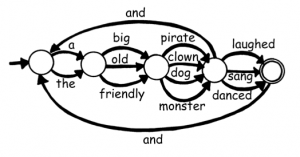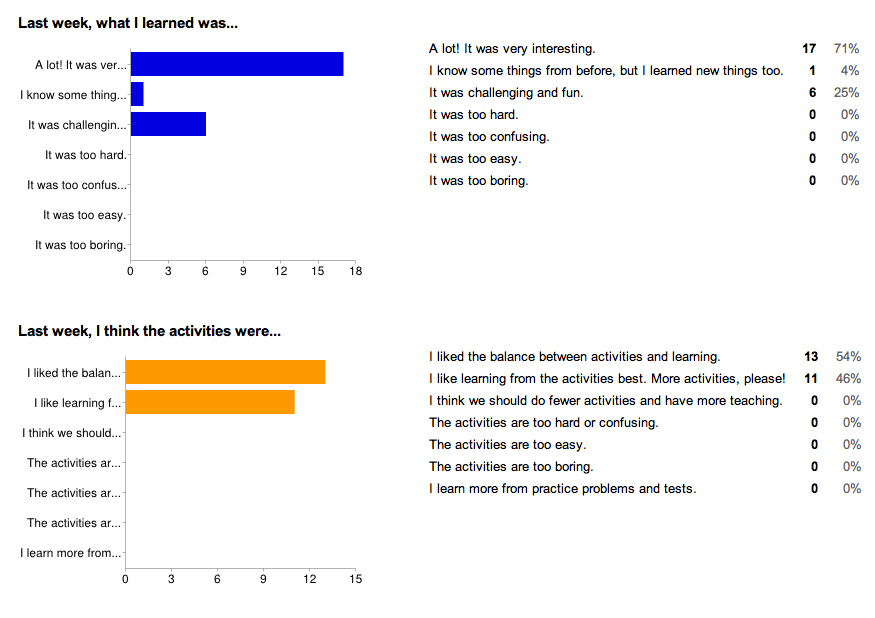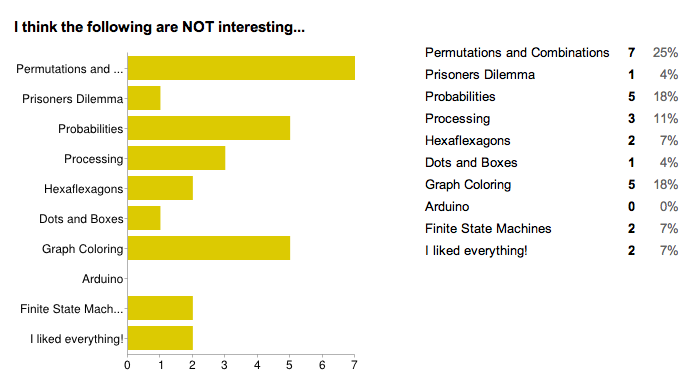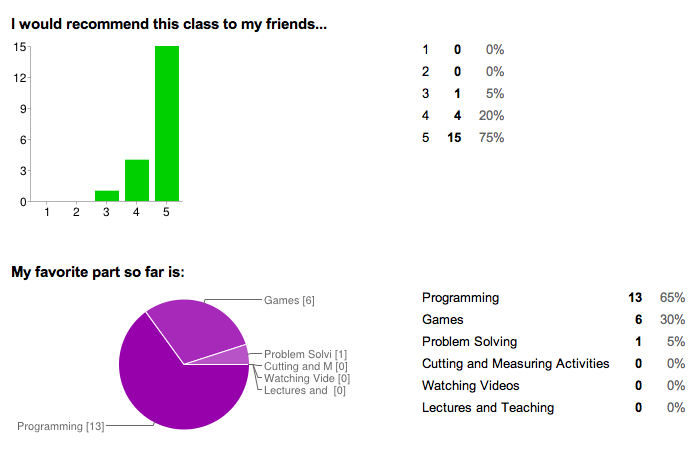Table of Contents
Exploratory Math
Description: The SPCS Honors Academy in Exploratory Math introduces students to foundational concepts of problem solving, engineering, computer programming, and design. Topics covered include: permutations and combinations, probabilities, geometry, graph theory, circuits, Boolean algebra, and logic. Every day begins with morning challenges and problem solving exercises, followed by a lecture. Before lunch, students will work in groups to apply the theory and practice learned from the morning. The afternoon will be focused on design and creative activities. The first week, the students will learn how to program in Processing, and create their own online programming portfolio and research blog in Wordpress. In week two, the students will have hands on practice to using the Arduino microcontrollers. On the last day, the students will work together to design and build their own city as the final project. At the end of every class, students will compile a research journal with the day’s discoveries in addition to giving daily feedback to shape the pace and preference for course practices. The course concludes with group research projects for a poster presentation on selected course topics in Exploratory Math.
Teacher: Sherol Chen
- email: ffpaladin@gmail.com
TA: Pia
Location: Santiago, Chile
Schedule
| Category | Topic | Project | Application | |
|---|---|---|---|---|
| Mon | Numbers | Game Theory | Games | Economics |
| Tue | Numbers | Probabilities | Graphs & Dice | Big Data |
| Wed | Spatial | Shapes | Tangrams | Computer Graphics |
| Thr | Spatial | 3-Dimensions | 3D Garland | 3-D Printing |
| Fri | Spatial | Graph Theory | Models | Social Networks |
| Mon | Circuits | Resistors | Arduino LED | Electronics |
| Tue | Circuits | Arduino | Arduino | Robotics |
| Wed | Logic | Logic Gates | Logic Gates | Computer Engineering |
| Thr | Logic | Formal Logic | Arduino | Storytelling |
| Fri | Final Project | City Design | City Project | Civil Engineering |
Topics
| Numbers | Spatial | Circuits | Logic |
|---|---|---|---|
| permutations | circle/sphere/cylinder | resistors | number systems |
| combinations | rectangles/squares/prism | volts | boolean algebra |
| probabilities | triangles/special triangles | current | demorgans law |
| bayes | cones/pyramids | circuit diagrams | logic gates |
| nash equilibrium | Distance equation | chips | universal/existential quantifiers |
| socially optimal | graph terminology | karnaugh maps | first order logic |
| prisoner's dilemma | different types of graphs | analog/digital | propositional |
| rock paper scissors | Traveling sales person | multimeter | induction |
| percentages | Trees | sensors | abduction |
| compound probabilities | Prefix notation | microprocessors | deduction |
Materials
| Week 1 | Monday | Tuesday | Wednesday | Thursday | Friday |
|---|---|---|---|---|---|
| 9 | Test | Wordpress | Writing | Writing | Writing |
| 9:30 | Processing | Processing | Design | ||
| 10 | Introduction | Processing | Processing Proj | ||
| 10:30 | Notebook | Lisp/Trees | |||
| 11 | BREAK | BREAK | BREAK | BREAK | BREAK |
| 11:30 | Write: About | Cascading Cards | Test | Pixels | Hexaflexagon |
| 12 | Permutations | Notebook Econ | Review | Problem Set | Postfix Notation |
| 12:45 | LUNCH | LUNCH | LUNCH | LUNCH | LUNCH |
| 1:30 | Game Theory | Review | Pixel Activity | 3-D Garland | Spaghetti Graphs |
| 2 | Games | Raindrops | Geometrical Scale | ||
| 2:30 | Games | Tangrams | |||
| 3 | Writing Time | Writing Time | Writing Time | Writing Time | Writing Time |
| Week 2 | Monday | Tuesday | Wednesday | Thursday | Friday |
| 9 | Writing | Graphs | Writing | Writing | Writing Time |
| 9:30 | Electricity | Traveling Sales | Digital/Analog | Research Proj | City Building |
| 10 | Circuits | Boolean Algebra | Arduino | Arduino | |
| 10:30 | Resistors | ||||
| 11 | BREAK | BREAK | BREAK | BREAK | BREAK |
| 11:30 | Current | Demorgan's Law | Arduino | Deduct/Induct | City Building |
| 12 | Double Imply | First Order | Vander Skype | ||
| 12:45 | LUNCH | LUNCH | LUNCH | LUNCH | LUNCH |
| 1:30 | Demo | Logic Gates | Review | City Proposal | City Building |
| 2 | MultiMeter | Arduino | Karnaugh Maps | ||
| 2:30 | Arduino | City Planning | Posters | ||
| 3 | Writing Time | Writing Time | Writing Time | Writing Time |
NyanVille Design Group
City Name: NyanVille
Mayor: Josefina - $9,999,999
Group 1 - $3,000,000
- Andreina
- Francisca
- Isabella
- Chen
- Sebastian
- Josefina
Group 2 - $4,000,000
- Laura
- Tomas
- Tomas
- Lorenzo
- Isabel
- Josefina
Group 3 - $3,000,000
- Francisco
- Felipe
- Marina
- Camile
- Margarita
- Josefina
Group 4 - $3,515,000
- Eitan
- Vittorio
- Nicolas
- Daniel
- Matias
- Josefina
Journals
Papo Y Yo Winners
- Vittorio
- Francisco
- Marina
- Eitan +1
Research Group
Prisoner's Dilemma
- Isabel
- Camila
Combinations and Permutations
- Matias
- Tomas Ald
Boolean Algebra
- Eitan
- Nicolas
Circuits
- Francisco
- Tomas Alt
Arduino
- Josefina
- Andreina
Traveling Sales Person
- Lorenzo
- Margarita
Processing
- Sebatian
- Daniel
- Vittorio
Game Theory
- Felipe
- Chen
Probabilities
- Marina
- Laura
Game Trees and Graph Coloring
- Isabella
- Francisca
Homework Challenges
These questions are meant to be challenges. They are meant to be hard. Try your best, but don't stress out over it. I will post the answers at the end of the program.
Q1. I want I fruit salad. I can choose from: apples, orange, bananas, mangos, kiwis, and watermelon. How many different fruit salads can I make?
Q2. I have 5 poker cards: 2 red and 3 black. What is the probability that I will pick a black card second. I do not put the first card back. The first card can be either red or black.
Q3. There are twelve coins, eleven of which are identical and one of which is different, but it is not known whether it is heavier or lighter than the others. The balance may be used three times to isolate the unique coin and determine its weight relative to the others.
Q4. My rulers come in 3 colors: R,G, and B. Every time you pick, you have a 1/3 chance of getting any color no matter what. What is the probability that I will get one red ruler or one green ruler in 2 picks?
Q5. What does (+ (* 4 5) (+ (- 9 2) 3 (+ 2 5 6)) (/ (* 10 2) 5)) equal?
Q6. Finite State Machine: Some friends downloaded a game from the Internet in which a robot flipped a coin and they had to guess whether it would turn up heads or tails. At first the game looked very easy. At least they would have a 50/50 chance of winning—or so they thought! After a while though they started to get suspicious. There seemed to be a pattern in the coin tosses. Was the game rigged? Surely not! They decided to investigate. Joe wrote down the results of their next attempts at the game and this is what they found: (h = heads, t = tails)
hhthhthhhtthhhhtthttthhhhhthhhttthhhttthhhhhhtthtt ttthtthttthhhtthhhthhhhhhhhhtthhhtttthhhhhttttttt
Can you find a predictable pattern?
There is a very simple ‘map’ that will describe the sequence of coin tosses. See if you can figure it out. (Hint: it has just 4 ‘islands’). Below is an example Finite State Machine:
Q7. Can you make a hexaflexagon?
Letter to Parents
Dear Parent,
The Exploratory Math class has been going very well this first week. The students are getting along well, and the materials have been both challenging and fun for them. I have been collecting daily feedback and have been adjusting my teaching to their comments and feelings about the day.
The students are all very different, so some will like computer programming, and one or two won't like it. Some like the lessons of probabilities and some prefer the creative activities. The students understand that they may not be interested in everything, but have been trying to give everything a chance.
Please take a look at their journal and encourage them to continue to focus and stay engaged in class. It is a very fun and creative group of people. Everyone is very nice to each other and becoming good friends. Your encouragement is important too.
If you would like to see the course materials and schedule, please go to: http://chile.sherolchen.com
There are some challenge questions that are meant to be very hard. I want the students to use the internet and try simple examples to understand how to use mathematics to solve these problems. I've been teaching them to simplify the problems first.
Below (above) is the list of student online research journals/websites.
Handouts
- Survey - 99 copies, single sided
- Pre-Test - 11 copies, double sided
- Rules and Contract - 11 copies, single sided - sent
- x&o Game Board - 22 copies, double sided
- bean game board - 11 copies, single sided
- about me - 11 copies, single sided
- hex game - 11 copies, single sided
- dot game - 11 copies, double sided
- pretest 2 - 11 copies, double sided
- Proportion Art - 3 copies, single sided
- raindrops - 11 copies
- nyan - 1 copy color
- Dots and Boxes book - 22 copies, single sided
- 3d garland - 12 copies, single sided
- computer graphics - 12 copies
- tangrams book - 22 copies stapled
- mario - 1 copy color
- paint - 1 copy color








